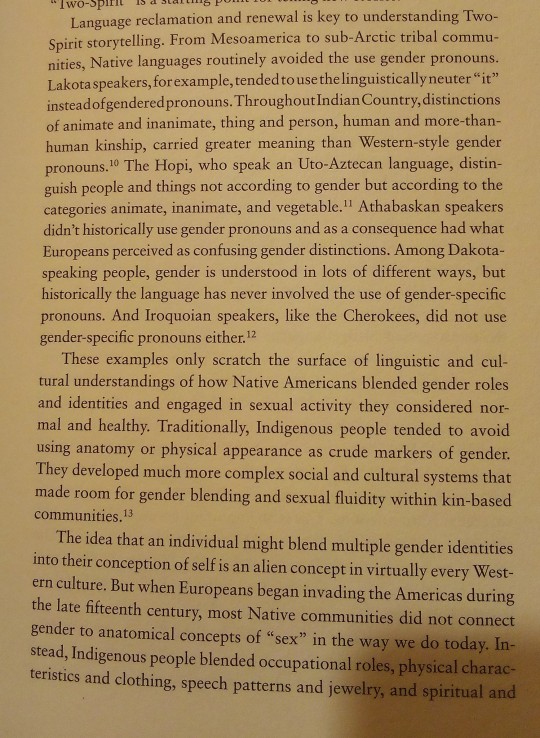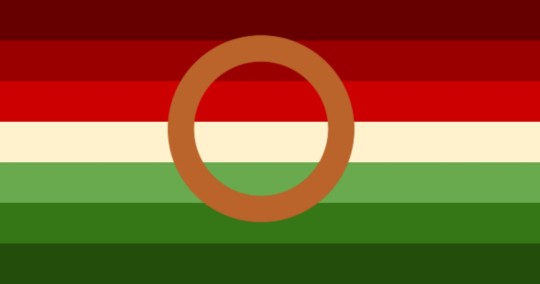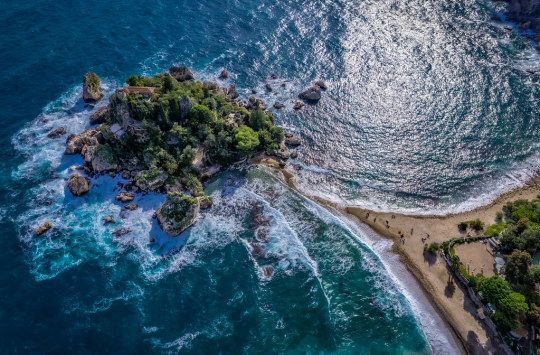#2s
Explore tagged Tumblr posts
Text

From Reclaiming Two-Spirits: Sexuality, Spiritual Renewal & Sovereignty in Native America, written by Gregory D. Smithers.
[Image ID: A photograph of a page from the book mentioned above which reads:
PROLOGUE
Two Spirit Natives are sacred
Lesbian Natives are sacred
Gay Natives are sacred
Bisexual Natives are sacred
Trans Natives are sacred
Queer Natives are sacred
Intersex Natives are sacred
Nonbinary Natives are sacred
- NATIVE AMERICANS in Philanthropy
End image ID.]
#queer#two spirit#2s#lgbt#lgbtq#lgbtq2s+#lesbian#gay#bisexual#trans#transgender#qpoc#tpoc#intersex#nonbinary#non binary#enby#queer history#queer literature#indigenous literature#our pics#resources#reference
1K notes
·
View notes
Text

- Somacultural Liberation An Indigenous Two Spirit Somatic Guide to Integrating Cultural Experiences Toward Freedom, Roger Kuhn.
I'm gonna frame this on my wall or something.
#biskaabiiyang#two spirit#2s#2 spirit#indigequeer#queer native#native american#ndn#n8v#indigenous#anishinaabe#anishinaabeg#anishinaabek#grace dillon#indigenous futurism#lgbt native#intersectional feminism#indigenous feminism#native gender#indigenous gender#transgender#trans native#pride month#queer books#indigenous books#book quotes#queer quotes#indigenous quotes#somacultural Liberation An Indigenous Two Spirit Somatic Guide to Integrating Cultural Experiences Toward Freedom#roger kuhn
44 notes
·
View notes
Text
my 2s repost the links should lead to archive links <3

Hi I want to apologize for taking so long to respond, I wanted to get my thoughts together, to answer this properly. This’ll be long.
First, it is important that I define to you what exactly I know and see two-spirit as/to be. I’ll start with the definition from wikipedia: “Two-spirit (also two spirit, 2S or, occasionally, twospirited) is a modern, pan-Indian, umbrella term used by some Indigenous North Americans to describe Native people in their communities who fulfill a traditional third-gender (or other gender-variant) ceremonial and social role in their cultures.”
What I know the usage of the term two-spirit to be, yes, it is quite an umbrella term. I find it used all over Canada and America by Indigenous youth who identify as trans, AND by those who are LGB. As it is in usage now, it seems to just be the catch-all for any GNC or LGB indigenous kid. A label. And although I do think it’s wonderful for any LGB or T-identified or gender non-conforming Indigenous child to find a label that makes themselves comfortable and makes it easier to find others who have the same life experiences, I also think it’s wrong.
The intention of Two-spirit is meant, as we see in the wiki definition, as a catch-all describer of “traditional third-gender, ceremonial and social role in their cultures” for anybody who is North American indigenous. Anon I’m sure you know already but for those that don’t, our roles, typically, are heavily appointed by Elders. You don’t just identify yourself into performing traditions, you are appointed it by elders, or else you ask for their, for lack of better word, blessing. But… you’d be hard pressed to find much of our culture that does this for a “third gender” or “two spirit”.
I can’t speak for every indigenous culture as I was raised mainly into the Cree part of my family and not the Saulteaux/Oji-Cree, but in Cree culture the word of our Elders is sacred. Oral history is how we learn of our culture, in part because we were hit hard in the Canadian genocide of First Nations. I can very safely say, out of all the things I learned from my elders, the only thing I ever had to “teach” them was what Two-spirit meant and what a third-gender is. Because they didn’t know. They could tell me what life was like before they were taken away from the reservation, they could tell me tales of creatures, of Wendigo and Little People, they could tell me and teach me what is sacred to us, what our roles as male and female are, but they couldn’t tell me what Two-spirit is. I had to learn that from the white man. Why is that? Well… possibly because it’s not a thing. It’s not sacred. It isn’t part of the history.
And even if it is in any subset of our cultures, all these kids and indigenous youth who use 2S to identify themselves? They were not appointed the term by elders, they label it themselves.
I think it is important to note here that “Two-spirit” itself was a term first (as we know so far according to Wikipedia, so take that as you will) founded and pushed out of Winnipeg, Manitoba, Canada, which is Treaty 1 territory, home to Anishinaabe. I am not a part of this territory (although I have Elder family members who are from Sandy Bay, who I can confirm also do not know of two-spirit) but one quick search of “anishinaabe third gender” will even only bring up modern day Two-spirit ideas, and the coining of the term in 1990. Same with any search for “(nation) third gender.” I have had a very lovely Anishinaabe anon in the past, and she has also vented her frustration at the use of the term, especially as an umbrella term for any Indigenous kid who is LGB or T, so I do take some assumption there from her that it is also not much of a thing in Ojibwe culture or any of the other Anishinaabe cultures.
What’s most important, and why I oppose it so much (other than the fact that it’s just, as I see, straight up a white man-made concept) is that the term “two-spirit” was created to replace other, more offensive words.
It’s main replacement is for “berdache”, a white (French) word, used against male Indigenous men, particularly homosexual Indigenous men. It is a slur. “Male berdaches did women’s work, cross-dressed or combined male and female clothing, and formed relationships with non-berdache men.”
It is, also, meant sometimes to replace the word, Winkte, or winyanktehca. Lakota meaning ‘wants to be like a woman’. Particularly used against, again, homosexual Lakota men.
It is, also, sometimes used as a replacement for Nádleehi, which was/is used in Diné culture as a word for effeminate males. Particularly used against, you guessed it, homosexual Diné men.
Now, to me, I think it is pretty plain to see that this is a term meant to replace some of our more homophobic terms used in Indigenous communities. But replacing homophobic terms with new ones doesn’t make it any less homophobic. These terms were meant to other homosexual indigenous men, and they were also used by white people. For us to, in this day and age when our culture is shifting to a less homophobic one, use the term two-spirit to continue to other LGB indigenous people? That’s not right to me. There was no reclamation of any of these terms, there was just a white replacement word that doesn’t sound as bad. But it still means the same thing. It’s still as white as a Frenchman calling a gay Indigenous man berdache.
I could keep going on and on, especially about how it is used in current day culture by indigenous youth as a special label, and how none of the people using it seem to actually have talked to their elders about it, but really my biggest problem with it is just how extremely homophobic it is. And how white people use it as “proof” that transgenderism has “always existed” when those same white people don’t even bother to fucking listen when some of us scream at them how wrong they are. And then I could keep going on screaming about how it’s been shoehorned as an acronym onto Missing and Murdered Indigenous Women which is so fucking disrespectful.
172 notes
·
View notes
Text
I love language & I am queer & I am learning cree/michif. For anyone else in a similar boat (like the other cree-learning michif trans man I know who went to school for anthropology) I think it is a worthwhile read!
#cree#nehiyaw#Métis#two spirit#napêw iskwêwisêhot#iskwêw ka napêwayat#ayahkwêw#înahpîkasoht#iskwêhkân#napêhkân#egwakwe#egwanini#intellectual colonialism#berdache#Agokwe#iyehkwiw#ayekkewe#2s#indigiqueer#indigenous#first nations#fnmi#native american
48 notes
·
View notes
Text


Fit of the day
#my face#nonbinary#non binary#enby#nb#enben#enban#trans#transgender#transneutral#genderfluid#genderqueer#genderneutral#genderweird#gender#gender identity#nonbinary transition#agender#queer#nonbinary pride#nonbinary selfies#gender envy#enbies#androgynous#transandrogynous#nonbinary people#twospirit#two spirit#2s
7 notes
·
View notes
Text
AAAAAAAHHHHH!!!!
I miss Shuma so much, it kind of hurts...
But at least with this photo of Yuki Totsuka and Sho Kaneta together, quite comfy with each other, it makes my little teacoffee heart happy (even if it's more of a promotional move, tease, whatever...)😊❤️
Ctto: Yuki Totsuka's talent management (Sony Music Artists)
("2S"?!? Hmmmmm.... 🤔)

#Yuki Totsuka#Sho Kaneta#Yuma Hize#Shu Ishido#Ultraman Arc#Guil Arc#Shuma#teacoffee#ctto#my heart#2S
11 notes
·
View notes
Text
happy pride to two-spirit beings
8 notes
·
View notes
Text

A passage from Reclaiming Two-Spirits: Sexuality, Spiritual Renewal & Sovereignty in Native America by Gregory D. Smithers.
[Image ID:
A photograph of a page from the book mentioned above, which reads:
"Language reclamation and renewal is key to understanding Two-Spirit storytelling. From Mesoamerica to sub-Arctic tribal communities, Native languages routinely avoided the use gender pronouns. Lakota speakers for example, tended to use the linguistically neuter "it" instead of gendered pronouns. Throughout Indian Country, distinctions of animate and inanimate, thing and person, human and more-than-human kinship, carried greater meaning than Western-style gender pronouns. The Hopi, who speak an Uto-Aztecan language, distinguish people and things not according to gender but according to the categories animate, inanimate and vegetable. Athabaskan speakers didn't historically use gender pronouns and as a consequence had what Europeans perceived as confusing gender distinctions. Among Dakota-speaking people, gender is understood in lots of different ways, but historically the language has never involved the use of gender-specific pronouns. And Iroquoian speakers, like the Cherokees, did not use gender-specific pronouns either.
These examples only scratch the surface of linguistic and cultural understandings of how Native Americans blended gender roles in and identities and engaged in sexual activity they considered normal and healthy. Traditionally, Indigenous people tended to avoid using anatomy or physical appearance as crude markers of gender. They developed much more complex social and cultural systems that made room for gender blending and sexual fluidity within kin-based communities.
The idea that an individual might blend multiple gender identities into their conception of self is an alien concept in virtually every Western culture. But when Europeans began invading the Americas during the late fifteenth century, most Native communities did not connect gender to to anatomical concepts of "sex" in the way we do today. Instead, Indigenous people blended occupational roles, physical characteristics and clothing, speech patterns and jewelry, and spiritual and... (text ends here)"
End image ID.]
#lgbtq#lgbt#two spirit#2s#lgbtq2ia+#queer#gender nonconforming#multigender#qpoc#indigenous literature#indigenous history#our pics#queer history#resources#reference
220 notes
·
View notes
Text
If your art of all the pride flags doesn't have the two spirit flag included too, you fucked up.
We are still here just as we have always been here.
See us. Include us.
Don't perpetuate the intolerance and bigotry of two spirits during pride month of all times.
#pride#pride flag#pride flags#pride art#lgbt#queer#2s#2 spirit#two spirit#gender#transgender#nonbinary
10 notes
·
View notes
Text


Indigenous / Native Intersex
for any natives who are intersex. This is exclusive to natives. Please credit if using !
id: an indigenous intersex flag. the colours from top to bottom are dark red, a less darker red, red, white, light green, green, dark green. there's an orange circle in the middle of it /end id

#mogai#mogai coining#mogai flag#mogai term#intersex#intersex flag#native#indigenous#native intersex flag#flag coining#pride flag#flags#two spirit#2slgbtq#2 spirit#2s
110 notes
·
View notes
Text

Participating in Art fight this year :) > artfight.net/~webdew
3 notes
·
View notes
Text

creds: jewishvoiceforpeace on ig
8 notes
·
View notes
Photo

Deep blue sea by Taz !
#mediterranean#beach#ocean#sea#landscape#seascape#reflections#island#taormina#sicily#sicilia#italia#rocks#waves#blue#turquoise#sand#isolabella#dji#air2s#air#2s#drone#apollo#italy#wpd22nature#flickr#thingsdavidlikes
20 notes
·
View notes
Text


Haven’t posted in a while but here a picture of my looking at a natural ochre deposit.
13 notes
·
View notes














